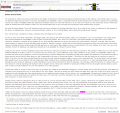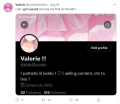One of our staff members is contributing considerably to a News Archiving service at Mu. Any well educated (Masters, PhD or above) users who wish to make comments on news sites, please contact Jim Burton directly rather than using this list, and we can work on maximising view count.
Adult Attracted Minor
 | |||||||
| Part of NewgonWiki's series on minor-attracted identities | |||||||
|---|---|---|---|---|---|---|---|
|
| |||||||
| Starting Guide | Community | Pediverse MAP | NOMAP | AAM | Neologisms "MAP" Origins | Flag | Movement Political history: MAP & LGBT Alliances Philias: Ephebo - Hebe - Pedo - Nepio Gender and attraction: BL - EL - GL Pederasty/Gay BL | Korephilia/Lesbian GL Pro-c | Neutral-c | Anti-c BLogo | GLogo | |||||||
|
| |||||||
| Category: Minor-attracted people | |||||||
| Template:MAI - This template |
Adult Attracted Minor (or AAM) is a term coined in reference to a legal minor who is sexually/romantically attracted to a person, or persons, who are legal adults. As commonly used, this can refer to preferential, non-preferential or indeed ephemeral attractions.
Origin
AAM (as commonly used) is likely to have emerged out of the 2018-19 publicity surrounding the term "Minor Attracted Person" and the MAP Flag. However, early uses have been located on old web-forums as early as 2002,[1] and also by Pedologues broadcaster Rookiee, as a "mirror image" of "Minor Attracted Adult" on his blog, Paiderastia, in May of 2006.[2]
Problematic etymology
"AAM" as a concept, is very poorly defined - especially in casual conversation among antis.
Non-preferential
The non-preferential use of "AAM" (i.e. "an AAM is a minor who experiences any attraction to adults") is sometimes deemed overbroad, since attraction to sexually mature people is normative among teens. Western society however, generally fails to accept this fact, instead perpetuating ageist bigotries such as deeming attraction to adults “inappropriate”, or dismissing it as "passing", "hormonal" or "lovesickness", as is generally the case in teen fiction. American society in particular, insists upon a period of "age appropriate" containment and "safeguarding", in effect a form of "age-apartheid" or "pooling of ignorance" until the “child” hits 18. As well as being biologically inappropriate, there is increasing acknowledgement of the fact that purity culture is harmful to minors.
Behavioral bias
For the reasons above, "AAM" is often (ab)used as a casual reference to minors who seek sexual contact with adults – in essence, “chasers”. "AAM" is thought to have been ascribed a behavioral definition by casual and hostile observers (MAPs among them), as "AAM behavior" is socially "atypical", and undeniable evidence of transgressive desires that Western adult society refuses to accommodate.
Most MAPs profess an ethical opposition to pursuing intimate relationships with minors, regardless of their opinions on easing Age of Consent laws.[3] This general skepticism and suspicion about "feds" and vigilantes impersonating teenagers, can lead to the unnecessary stigmatization of AAMs and younger MAPs.
AAM Activism
AAM activism is often seen as an acid-test for pro-c MAP activists. If and when minors are able to freely speak out, the upside risk for MAP activism in general, increases exponentially. Mark Moffett Jr, covered in Youth Perspectives was the most famous AAM activist, although he will not have used the term to describe himself. Another boy, Jesse Harrison worked with NAMBLA toward similar ends.
Criminalization and Pathologization of AAMs
In a broader sense, it is well known that the younger partners in age disparate encounters can be criminalized under laws against juvenile prostitution, or delinquency in the example of Craig Rodwell. In Russia, the clinical term "age related psychopathy" was ascribed to a female AAM who sought encounters with older men.[4]
Official Guidance⁽ᵂʰᵃᵗ ᶦˢ ᵗʰᶦˢˀ⁾ - Spotting fake/bait AAMs
Fake/bait AAM personas used by anti-MAP vigilantes are known to demonstrate a few common traits (see gallery below):
- Anonymous, non-photographic persona, fake/stolen photos, or otherwise will not "flash" face or private features, as they are an adult and it would give the game away. For legal reasons, we do not suggest that you try to "test" this rule.
- Forward with sexual advances, requests for photographs. Ever so happy to "meet" after a photo and some sweet words. Most actual minors are as discriminating and picky as adults, and many will be shy and nervous.
- Types in the style of a bored housewife impersonating a stereotyped teen. Repeats "lol" - is this really how teens communicate? Performative cuteness that is too cliché for an actual teen ("heyyyy").
- Inconsistency in confected traits such as slippage in use of decapitalization.
Newgon Organization strongly warns its followers against the idea of communicating with supposed minors for "sexual" purposes. If a person finds it impossible to resist fantasy cybersex, they should make it clear from stage one (and record it), that it is a fantasy discussion, and that they believe beyond reasonable doubt, that they are communicating with an adult. Under some laws (e.g. "Sexual Communication With a Child" in the UK) meeting a decoy isn't even necessary for a conviction.
Who has an "AAM problem"?
- See minor attracted community for further insight.
Multiple moral "gatekeepers"[5] of social media, including members of the LGBT community (where "loved boys" were sheltered in the 70s, 80s and even 90s) are known to police and report AAMs. They derogatorily refer to them as a "problem". One of the ironies of this policing action, is that many of the self-proclaimed AAMs are likely to be poseurs, members of Anonymous, extortionists or organized criminals.
- Twitter.com - according to numerous people on said website
- Discord - frequently claimed on social media
- Chansites
- Modern social media platforms in general
- Wickr and Telegram
- Roblox[6]
Gallery
-
An AAM Flag does exist (right)
-
A closer look
-
Integration of the flag into artwork (Silver, via PCMA)
-
Use of flag by bee, PCMA
-
An early mention in 2006 (no flag or identity existed at this point)
-
Examples of minors or purported minors seeking to sell content on Twitter.com. This activity represents much of what Elon Musk famously promised to clamp down upon when taking over at the platform.
-
Another such example
-
Example of a more obvious fake AAM
See also
References
- ↑ Manstuprator finds "AAM" on old BBS
- ↑ Rookiee
- ↑ Behavioral data, documenting the high frequency of attraction to minors in the general population and low frequency of pedophilia in the criminal population, all but confirms the existence of numerous non-offending MAPs and pedophiles in society.
- ↑ Google Translated Russian news article in which a girl is clinically labelled
- ↑ ReadyToGlare YT
- ↑ Roblox "grooming"







